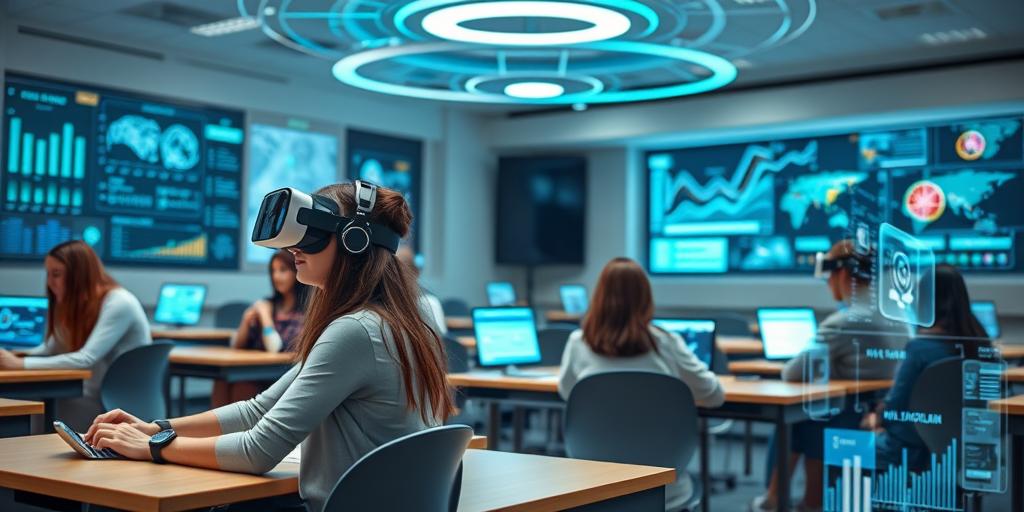The world is rapidly evolving, driven by advancements in Education Technology and the emergence of groundbreaking technologies like artificial intelligence, automation, and biotechnology. These innovations are reshaping industries, creating new opportunities, and presenting challenges that require a forward-thinking approach to education. To prepare for this future, it’s crucial to understand the impact of emerging technologies on the workforce and how education can play a vital role in equipping individuals with the skills they need to thrive.
The Impact of Emerging Technologies on the Future of Work
Emerging technologies are transforming the landscape of work, leading to both opportunities and challenges.
Automation and Job Displacement
Automation is rapidly taking over routine tasks, potentially leading to job displacement in certain sectors. This is particularly true in manufacturing, transportation, and customer service, where repetitive tasks can be easily automated.
The Rise of New Industries and Skills
However, emerging technologies also create new industries and jobs that require specialized skills. The growth of fields like data science, cybersecurity, and artificial intelligence is generating a demand for professionals with expertise in these areas.
The Importance of Adaptability and Lifelong Learning
The key to navigating this changing job market is adaptability and a commitment to lifelong learning. As technology continues to evolve, individuals must be willing to acquire new skills and adapt to new roles throughout their careers.
The Role of Education in Preparing for the Future
Education plays a critical role in preparing individuals for the future of work by equipping them with the skills, knowledge, and mindset needed to navigate a rapidly changing world.
Developing Essential Skills for the 21st Century
Education Technology can be instrumental in developing essential skills for the 21st century, including:
Critical Thinking and Problem-Solving
Students need to be able to analyze information, identify patterns, and solve complex problems. Education Technology can foster critical thinking skills through interactive simulations, data analysis tools, and project-based learning.
Creativity and Innovation
The ability to think creatively and come up with innovative solutions is becoming increasingly valuable in the workplace. Education Technology can encourage creativity through design thinking exercises, collaborative projects, and access to digital tools for creative expression.
Collaboration and Communication
Effective collaboration and communication skills are essential for success in today’s interconnected world. Education Technology can facilitate collaboration through online platforms, video conferencing, and group projects.
Digital Literacy and Technology Skills
In the digital age, it’s essential for individuals to be comfortable with technology and understand its applications. Education Technology can help students develop digital literacy skills through coding classes, online learning platforms, and access to digital tools.
Fostering a Growth Mindset and Adaptability
Beyond acquiring technical skills, education needs to foster a growth mindset, which emphasizes the belief that abilities can be developed through effort and perseverance. This mindset is crucial for individuals to embrace lifelong learning and adapt to new challenges.
Promoting Interdisciplinary Learning and Cross-Sector Collaboration
The future of work requires individuals to understand the interconnectedness of different fields and collaborate across sectors. Education should promote interdisciplinary learning experiences that expose students to diverse perspectives and foster collaboration across disciplines.
Transforming Education Systems for the Future
To adequately prepare students for the challenges and opportunities of the future, education systems need to adapt and evolve to embrace Education Technology and innovative teaching methods.
Integrating Technology into the Curriculum
Education Technology should be seamlessly integrated into the curriculum, not just as a supplemental tool but as a core element of learning. This includes using interactive software, online platforms, and virtual reality to enhance learning experiences.
Developing Personalized Learning Experiences
Education Technology enables personalized learning experiences that cater to individual needs and learning styles. Adaptive learning platforms, personalized learning paths, and individualized feedback can help students learn at their own pace and achieve their full potential.
Enhancing Teacher Training and Professional Development
Teachers need to be equipped with the skills and knowledge to effectively integrate Education Technology into their teaching practices. This requires ongoing professional development programs focused on technology integration, pedagogical innovation, and digital literacy.
Promoting Access to Education and Lifelong Learning Opportunities
Education needs to be accessible to all, regardless of background or location. This includes expanding access to online learning platforms, providing scholarships and financial aid, and offering lifelong learning opportunities to help individuals stay competitive in the evolving job market.
The Importance of Education in Shaping the Future of Work
Education Technology is not just about acquiring technical skills; it’s about developing the critical thinking, creativity, and adaptability needed to thrive in a rapidly changing world.
Education is a powerful catalyst for innovation and progress, empowering individuals to embrace the opportunities and overcome the challenges presented by emerging technologies. By investing in education and training, we can create a future where technology serves humanity and unlocks a world of possibilities.




